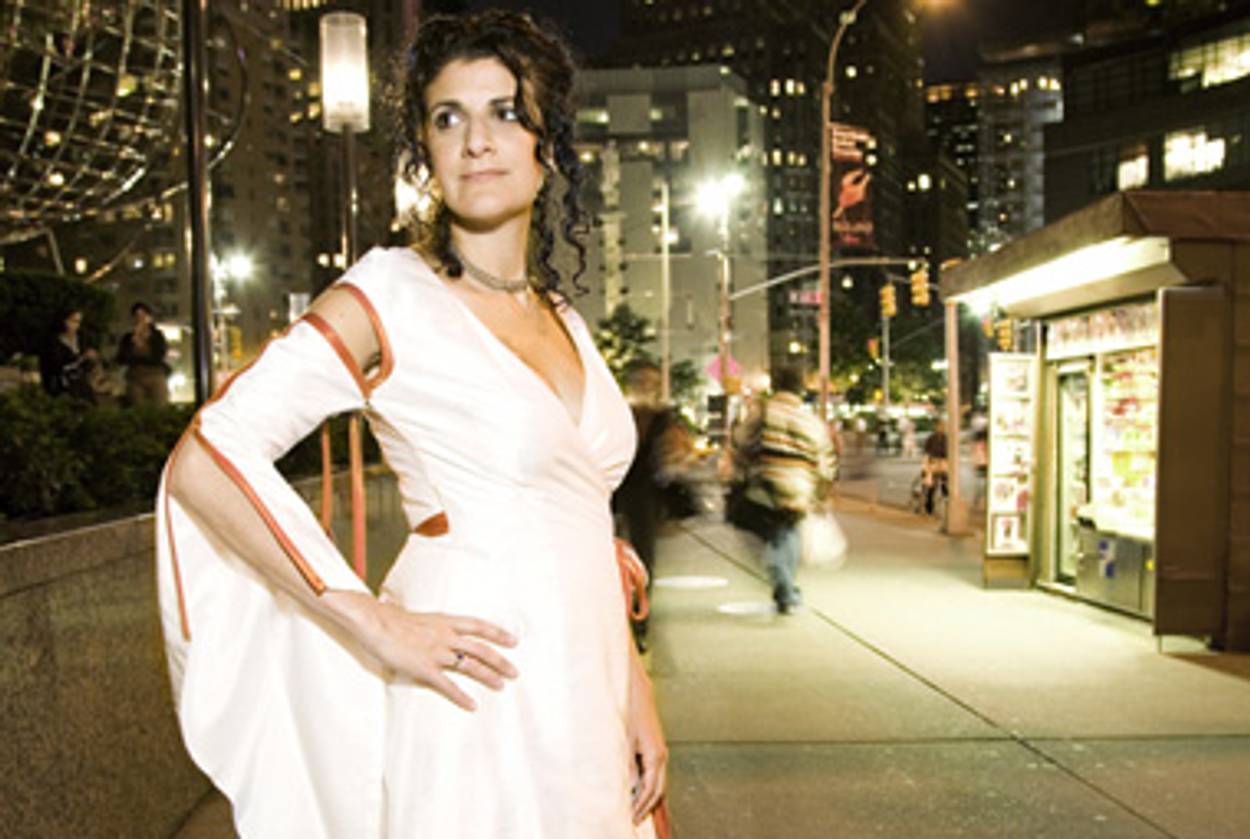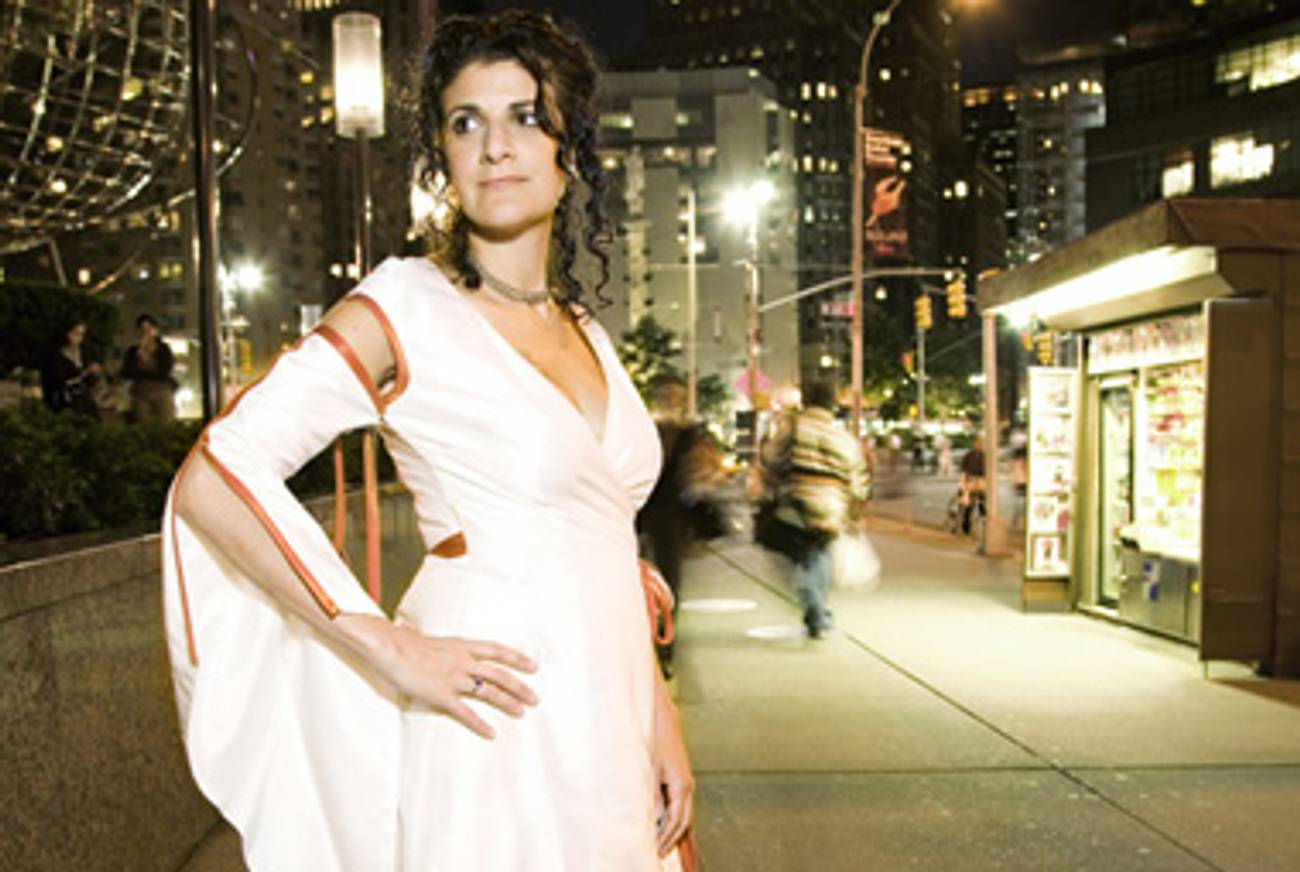Redemption Songs
In The Naming, Galeet Dardashti honors the Bible’s unsung women




When I asked Galeet Dardashti what she had learned from the biblical, talmudic, and midrashic texts that she had mined for her latest project, The Naming—texts that deal with iconic and, in Dardashti’s opinion, misunderstood female figures like Sheba and Dinah and Michal—she paused for a moment.
“I learned,” she said, after careful consideration, “that it is really hard work to create something new and your own from those texts.”
Hard work, to be sure; but worth it, judging by the results.
The idea for The Naming, which encompasses a CD due out September 14 along with song-specific videos and dance pieces, came to Dardashti shortly before the birth of her son two and a half years ago. “Gender hadn’t really been an issue for me up until that point,” says Dardashti, who leads the all-girl band Divahn and recently completed a PhD in cultural anthropology. “We were three girls in my family, and there was never any question that there was something we couldn’t do. But it suddenly occurred to me that, yes, I am a woman; and my husband and I are going to have really different roles in child rearing.” That led her to consider some of the women who have been misrepresented in rabbinical commentary down through the ages—like Vashti, the queen of Persia, whom Dardashti claims the rabbis vilified so as to make her replacement by Esther appear more just; or Sheba, Solomon’s lover, whom they made out to be some kind of half-animal, with excessively hairy legs and perhaps even a tail.
At the same time, Dardashti had been delving deeper and deeper into the music of Sephardic and Mizrahi Jews—including the Persian tradition represented by her grandfather, Yona Dardashti, who had been a cantor and renowned singer of Persian classical music in Iran during the days of the Shah; and her father, Farid Dardashti, once a pop star in Tehran and now a cantor at Beth El Synagogue in New Rochelle, New York. The latter first introduced her to the Persian style of cantillation, which is closely related to the classical music that his own father sang, and that Dardashti heard at family gatherings and on her grandfather’s old recordings. She began to perform the music in public, and the response was encouraging.
“The reaction I got from older Sephardic and Mizrahi women was, ‘Wow, hearing a woman do this repertoire is really powerful!’ ” she said.
That reaction might have had something to do with the particular woman they were hearing. There’s a lot to recommend The Naming, including the skillful blending of electronic beats with Middle Eastern hand drums and other acoustic instruments (dig the lean string arrangements on “Dinah,” and the gorgeous santur solo on “Vashti”). But nothing is more satisfying than the sound of Dardashti’s own voice. From the first notes of the opening track, “Michal,” you know that you’re dealing with someone in possession of an unusually powerful and flexible instrument.
Dardashti wrote “Michal” as an homage to her great-aunt Tova, who, like her biblical predecessor—the woman who saved her future husband, David, from the wrath of her father, Saul—donned tefillin like a man. Appropriately enough, she begins the piece by chanting the prayer for the wearing of phylacteries, using a vocal ornament called taqrir that sounds almost like ululation and that comes straight out of Persian classical technique.
It’s an amazing sound, and Dardashti initially doubted her ability to master it when she began studying Persian classical music. She was in Israel at the time, researching her dissertation on the political implications of Middle Eastern and Arab music in the country, and she found a Persian-Jewish singer who knew her grandfather’s music and was willing to teach her the tradition. “I had heard this music growing up, but it wasn’t the stuff that was playing in my house. It was pretty foreign to me,” she said. “I thought there was no way in hell I would get those sounds to come out of my mouth, but it happened really fast.”
Similarly, on “Dinah,” Dardashti chants in the Persian style that she learned from her father. It doesn’t sound anything like Ashkenazi cantillation; but it’s not quite like other Sephardic or Mizrahi styles either.
Persian music is, in general, distinct from the Arab music with which most Westerners are familiar. For one thing, it is based on a modal system known as dastgah, which is not the same as the maqam system prevalent throughout the rest of the Middle East. That distinctive flavor has rubbed off on Persian Jewish music as well. You can hear it straight from Farid Dardashti’s own mouth as he chants from the book of Samuel on “Endora,” which recounts the meeting between King Saul and the witch of Endor. (Saul asks the witch to summon the ghost of Samuel, hoping for some advice on how to defeat the Philistines; what he gets is a prophecy of his own doom.)
Indeed, one of the delights of The Naming lies in the way Dardashti weaves many different strands of Sephardic and Mizrahi music into the mix. “Dinah,” for example, employs a text from a Sephardic piyut, or song of supplication, that is traditionally sung at the birth of a girl. The traditional Moroccan melody Dardashti uses for it is as distinct from the Persian chant of “Michal” as Memphis crunk is from DC go-go.
Not everybody appreciates these distinctions. At least some of the people who come to hear Dardashti perform this material think it all just sounds vaguely Islamic. “The most common question I get is, ‘What’s Jewish about this music?’ ” she said. “They’ll say, ‘It sounds like a muezzin’s call to prayer!’ ”
It’s a fair point—Jewish and Islamic music have a lot in common, and if you weren’t familiar with Sephardic or Mizrahi chant, you might easily mistake them for their Arab equivalents—but it obscures a larger one.
Jews have been living in the Middle East and surrounding regions for a long time; the longest time, one might say. And it would be nice if their unique traditions, musical and otherwise, were better known and more widely appreciated within the broader Jewish community. Dardashti intended The Naming to call attention to some of the biblical female figures that have been slighted or distorted down through the ages; but she has also succeeded in calling attention to a vast body of music that has for many years been given relatively short shrift by Ashkenazim like me. If to name it is to claim it, I’ll gladly call it my own.
Alexander Gelfand is a recovering ethnomusicologist, a sometime jazz pianist, and a former West African drummer. His work has appeared in the New York Times, the Chicago Tribune, the Forward, and elsewhere.
Alexander Gelfand is a recovering ethnomusicologist, a sometime jazz pianist, and a former West African drummer. His work has appeared in the New York Times, the Chicago Tribune, the Forward, and elsewhere.